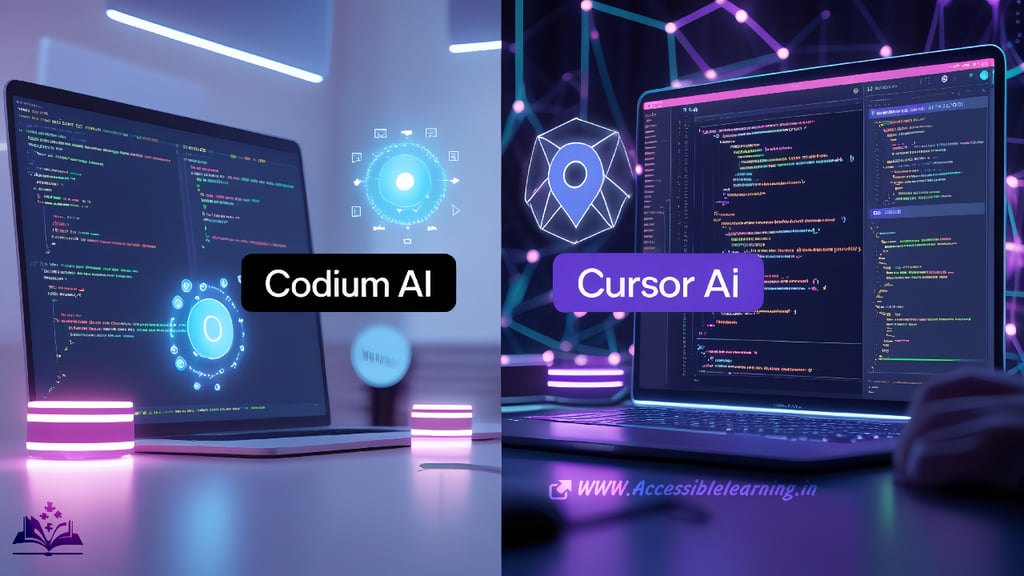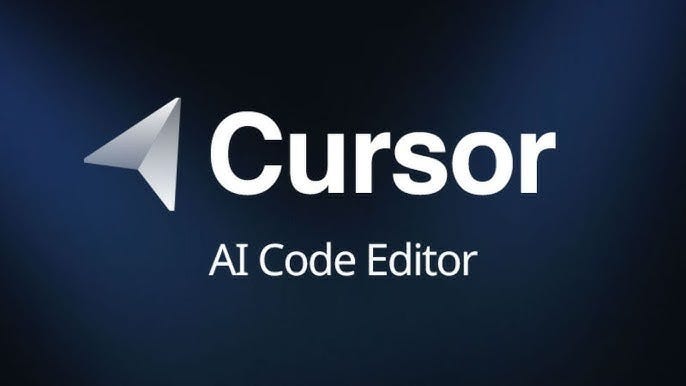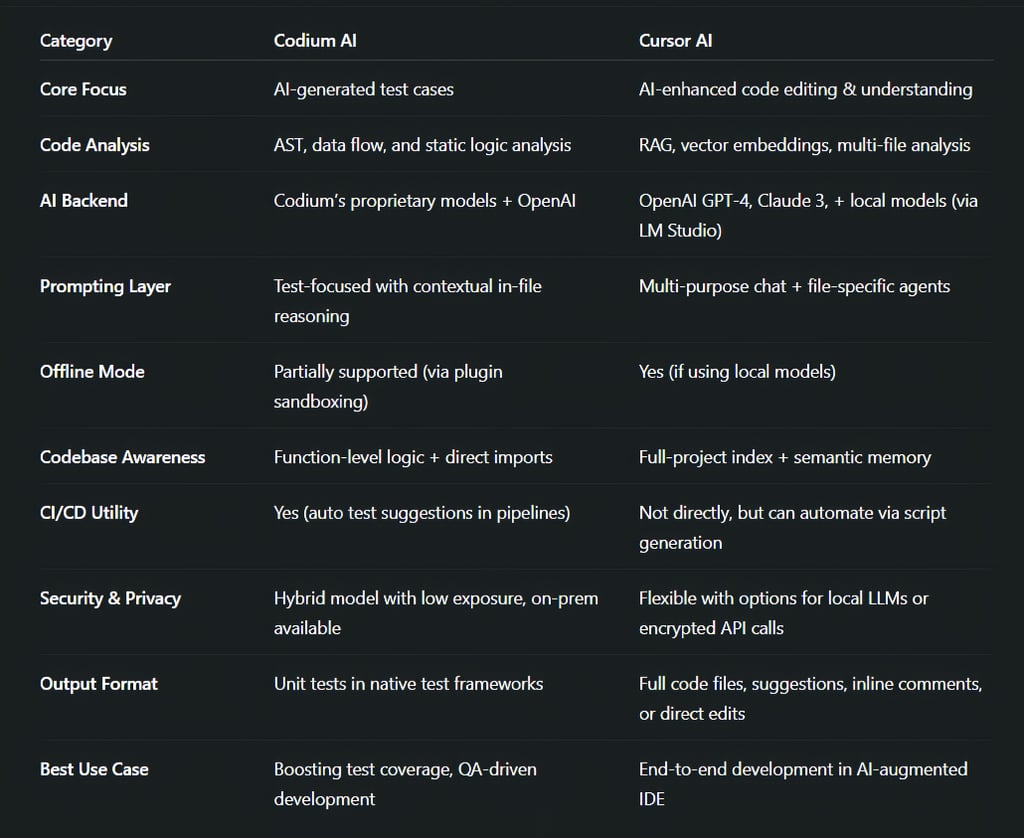
Codium AI vs Cursor AI: A Deep Dive Into Next-Gen AI Coding Assistants
Explore a detailed technical comparison between Codium's AI-powered test generation and Cursor’s AI-native IDE. Learn features, use cases, and which tool suits your development needs best.
AI ASSISTANTAI/FUTUREPROGRAMMINGEDUCATION/KNOWLEDGE
Sachin K Chaurasiya
5/6/20255 min read


As the lines between software development and artificial intelligence blur, tools like Codium AI and Cursor AI are reshaping the developer experience. They aren't just helpful assistants anymore—they’re becoming collaborative partners that understand, write, test, and refactor code with near-human reasoning.
Whether you're aiming for automated testing, context-aware development, or a complete AI-powered IDE, understanding the technical backbone and differences between Codium AI and Cursor AI is critical.
Let’s explore Codium AI vs Cursor AI through a deeper, more technical lens.
What is Codium AI?
Codium AI is an intelligent coding assistant primarily focused on test generation and validation. It's designed to help developers write reliable, bug-resistant code faster. Codium deeply analyzes code logic and auto-generates meaningful test cases (unit tests, integration tests, etc.) with minimal effort. Using LLMs (Large Language Models) tailored for code comprehension, Codium automatically analyzes your functions, control flow, and edge conditions to produce unit and integration tests.
Key Features
Auto-Generated Tests: Creates comprehensive tests based on function logic.
IDE Integration: Available as plugins for VS Code, JetBrains IDEs, etc.
Semantic Analysis: Understands context, detects edge cases, and recommends test improvements.
Security & Privacy: Does not upload your code to public servers; ensures enterprise-level safety.
Multi-Language Support: Currently supports Python, JavaScript, and TypeScript and is expanding.
Technical Capabilities
AST (Abstract Syntax Tree) Analysis: Codium parses your code into AST format to understand the structure and logic of your functions.
Symbol Resolution & Type Inference: It resolves function dependencies and infers types (even in dynamically typed languages like Python).
Data Flow Analysis: Tracks variables, I/O paths, and potential state mutations for comprehensive test coverage.
LLM-Driven Test Generation: Utilizes fine-tuned transformer models to create intelligent and non-redundant test cases.
Mutation Testing Suggestions: Highlights unhandled edge cases and suggests logic mutations to verify test strength.
Inline Contextual Feedback: Provides explanations for why certain inputs/outputs were chosen in test cases.
Toolchain & Integrations
IDE Plugins: JetBrains (PyCharm, IntelliJ), VS Code.
Language Support: Python, JavaScript, TypeScript (with upcoming support for Java, Go).
Build Tool Compatibility: Works seamlessly with pytest, unittest, Jest, etc.
CI/CD Integration (in beta): Plug into GitHub Actions for automated test generation on pull requests.
Security Infrastructure
Codium runs in a hybrid cloud environment with minimal code uploads.
Offers on-prem solutions for enterprises.
Supports GitHub OAuth and role-based access control (RBAC) for team use.
Ideal For
Developers and QA teams who prioritize code coverage, test automation, and robust validation in the development process.


What is Cursor AI?
Cursor AI is a forward-thinking, AI-native code editor built on VS Code, but turbocharged with AI-powered features. Think of Cursor as VS Code with ChatGPT built-in and trained on your codebase.
Key Features
AI-Powered Code Autocomplete: Like GitHub Copilot, but contextually smarter within your project.
Ask Cursor (Code Q&A): Lets you ask questions about your code, dependencies, or logic.
Code Refactoring & Generation: Modify entire files or generate new ones from prompts.
Code Navigation: Offers semantic search and smart suggestions based on project-wide understanding.
Built-in Terminal + Version Control: Like a power-enhanced VS Code.
Advanced AI Features
RAG (Retrieval-Augmented Generation): Uses vector embeddings of your codebase to pull relevant context for accurate completions and responses.
Persistent Memory of Codebase: Automatically indexes the project and understands relationships between files, functions, classes, and APIs.
Function-Level Understanding: Reads and reasons over multiple modules at once to provide file-wide or repo-wide refactorings.
Doc-to-Code Transformation: Turn plain English specs into full component stubs or even fully functional code with tests.
Multi-Agent LLM Workflow (in beta): Different LLM "agents" perform distinct tasks like bug hunting, performance optimization, or legacy migration.
Editor Enhancements
Semantic Navigation: Jump to definitions, usages, or similar logic via LLM-powered search.
Command Palette AI Actions: Use prompts like “Refactor for performance,” “Add error handling,” or “Explain this module.”
Built-In Chat Assistant: Connected to ChatGPT 4-turbo, Claude 3, and local models for low-latency responses.
Team Knowledge Sharing: Cursor stores chat history and AI insights per project—excellent for onboarding or collaborative work.
DevOps and Platform Integration
Native Git support (commit, diff, branch via AI).
LSP support and plugin compatibility with VS Code ecosystem.
Terminal and Jupyter notebook features integrated within the editor.
Local model support: Can run via LM Studio or Ollama for offline development.
Ideal For
Developers who want an end-to-end coding environment where the AI assists not only with writing code but also with understanding, debugging, and refactoring large codebases.


Human-Centric Perspective: Which One Should You Use?
If your biggest pain point is writing test cases, especially in large or legacy projects, Codium AI is your best friend. It doesn’t just generate boilerplate—it thinks about what the code is doing and why.
If you're constantly switching tabs between documentation, Stack Overflow, and your IDE, then Cursor AI is a massive upgrade. It turns your development workflow into a conversational experience where you can "talk to your code."
Privacy & Security
Both Codium AI and Cursor AI emphasize security, but in different ways:
Codium AI has minimal code transmission and prioritizes enterprise-grade data security.
Cursor AI, since it integrates deep AI features into the editor, may connect with cloud-based LLMs—but also allows for private model configurations for teams.
Which AI Tool Should You Choose?
Choose Codium AI if:
You want reliable test automation with deep logic analysis.
You work in high-integrity code environments like fintech or medtech.
You prefer to keep your development stack and enhance it selectively.
Choose Cursor AI if:
You want a modern IDE replacement powered by AI.
You manage large, evolving codebases with many collaborators.
You’re looking for prompt-driven code development, navigation, and debugging.
There’s no universal answer—but here's a distilled guide:
Choose Codium AI if:
You want better test coverage without writing every test by hand.
You're part of a QA or dev team focused on quality and validation.
You prefer to keep your current IDE and enhance it.
Choose Cursor AI if:
You want a smarter version of VS Code that knows your code.
You're building large projects and want AI help everywhere.
You’re comfortable using an entirely new AI-first IDE.
FAQs
What is the main difference between Codium AI and Cursor AI?
Codium AI specializes in generating intelligent test cases for your code, helping boost quality assurance, while Cursor AI is a full AI-native IDE built on VS Code that enhances every part of the development process—coding, debugging, and navigation.
Is Codium AI only useful for testing?
Primarily, yes. Codium AI is designed to automate test generation and suggest edge cases using AI. However, it also improves code quality and helps identify potential bugs during development.
Can Cursor AI replace my current IDE like VS Code or JetBrains?
Yes, Cursor AI is a modified version of VS Code with deeply integrated AI features. It can function as a complete replacement, offering real-time AI assistance across your entire codebase.
Do Codium AI and Cursor AI support multiple programming languages?
Codium AI supports Python, JavaScript, and TypeScript, with plans to expand. Cursor AI supports nearly all major languages supported by VS Code, including Python, JavaScript, Go, Rust, and more.
Are these tools secure for enterprise or private projects?
Yes. Codium AI offers on-premise deployment and minimal code exposure. Cursor AI supports both cloud-based and local AI models, making it flexible for privacy-conscious teams.
Can I use both Codium AI and Cursor AI together?
Absolutely. Many developers use Codium AI for test generation and Cursor AI as their daily development environment. They complement each other well in a modern AI-assisted workflow.
Subscribe To Our Newsletter
All © Copyright reserved by Accessible-Learning Hub
| Terms & Conditions
Knowledge is power. Learn with Us. 📚


